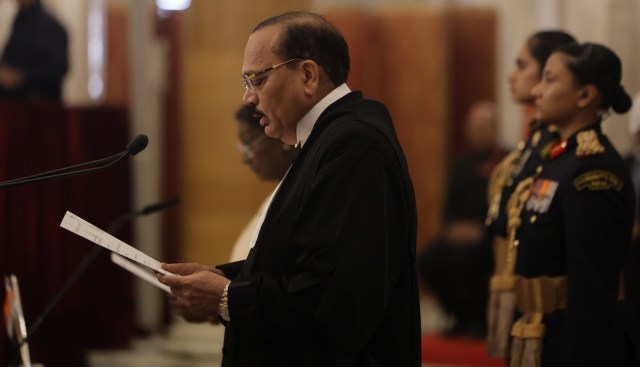© IE Online Media Services Pvt Ltd
- Tags:
- BR Gavai
- supreme court
- Surya Kant
Latest Comment
Post Comment
Read Comments
 CJI Surya Kant Remarks: President Droupadi Murmu administered the oath of office to Justice Kant, who will remain in office till February 9, 2027. (File Photo)
CJI Surya Kant Remarks: President Droupadi Murmu administered the oath of office to Justice Kant, who will remain in office till February 9, 2027. (File Photo)CJI Surya Kant Remarks: Justice Surya Kant on Monday took oath as the 53rd CJI after being administered oath by President Draopadi Murmu at Rashtrapati Bhawan.
He succeeds Justice B R Gavai, who demitted office on November 23 after being in office for a little over six months. As a Supreme Court judge, Justice Kant presided over matters spanning a wide spectrum of legal domains, including constitutional law, social justice, electoral integrity, and governance.
The following observations and judicial pronouncements in these matters garnered significant public attention.
1. “What kind of a thing is this? How are you promoting this in 2025? Whatever best religious practice we follow, is this what you allow? Is this how the dignity of a woman be upheld? Should a civilised society allow this kind of practice?” – The newly sworn-in CJI was recently hearing the challenge to Talaq-e-Hasan, a form of divorce practiced within a section of the Muslim community, when he was critical of the religious practice, indicating that the top court may refer the question to a five-judge Constitution bench.
2. “The report shows the extent of fraud is very big ₹3,000 crore was collected from victims in India alone. What would be the suffering at the global level?” – Justice Kant came down heavily on the issue of “digital arrest” in November as he promised to deal with the issue with an “iron hand”.
3. “Right to dignity also emanates from the right which someone else is claiming… Article 19 can’t overpower Article 21… Article 21 must prevail if any competition takes place.” – Justice Kant made the observation while hearing a matter related to stand-up comedian Samay Raina over alleged insensitive jokes about persons with disabilities.
4. “The exercise of judicial power must be tempered by humility and guided by constitutional boundaries. Courts must not supplant the role of the legislature or override the will of the people. Instead they must act as facilitators of democratic dialogue — strengthening participatory governance, protecting the vulnerable, and ensuring that the rule of law prevails even in moments of political uncertainty.” – Justice Kant shared his thoughts at Asia Society Northern California, San Francisco, in June while cautioning against judicial overreach and underlining the focus areas of courts when adjudicating matters.
5. “The Collegium system significantly limits interference by the Executive and Legislature, thereby preserving the judiciary’s autonomy and insulating judges from extraneous pressures that could otherwise compromise their impartiality,” Justice Kant was speaking at the Seattle University on ‘The Quiet Sentinel: Courts, Democracy, and the Dialogue Across Borders”, in June as he noted the positives of the Collegium system.
6. “The thing is, in this country, the reservation business has become like a railway. Those who have entered the bogie, they don’t want anyone else to enter. That is the whole game.” – The strong comments of the judge on reservations came in November in a case relating to OBC reservation during Maharashtra’s local body polls.
7. “When we analyse climate change, its effects and its counter measures through a domestic lens, we often see, and a perception is created on this, that India and other developing countries disproportionately bear the brunt of taking the blame for environmental damage and climate change. While I am not suggesting there is no room for improvement on our part when it comes to sustainable practices, wrongdoers often fly under the radar.” – The judge in July 2024 defended India’s path as a developing economy and noted that it cannot be blamed disproportionately for environmental damage and climate change in the world.
8. “Just get rid of these cases. People need judgments, they are not concerned about jurisprudence or something else. Give a reasoned order on whether relief is denied or allowed” – Justice Kant in July took exception to the non pronouncement of judgments by courts as he highlighted the people’s judicial rights. He was hearing a matter filed by convicts from Jharkhand on the issue.
9. “Courts deepen democracy when they “act to empower the powerless, grounded in constitutional text and moral clarity.” – Justice Kant in October spoke in the Sri Lankan Supreme Court on ‘The living Constitution: How the Indian Judiciary Shapes and Safeguards Constitutionalism’ where he spoke on the role of judiciary in upholding democracy and constitutional ideals.
10. “With the right vision and safeguards, technology can break geographical barriers, democratise legal awareness, and bring legal aid to the doorstep or rather the palm of every citizen. If harnessed thoughtfully and inclusively, it can bridge the persistent gaps in our justice system.” – Justice Kant underlined the significance of using technology “thoughtfully and inclusively” in bridging the persistent gaps in our justice system in August.
These remarks and views show how CJI Surya Kant’s approach is based on constitutional ideals, balancing rights with duties, protecting disadvantaged populations, and making the courts more accountable and open.




